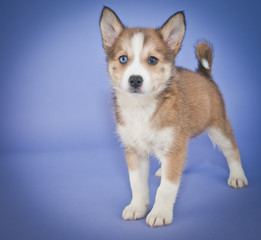Purchasing a Pomsky puppy is a great decision, but you may wonder what the best breed for you is. The best breed of dog is one that has the temperament, appearance, and genetics that you are looking for. Whether you are looking for a new family pet or want to help the homeless animals in your area, a Pomsky is a great choice. This hybrid breed is a mix of Siberian Husky and Pomeranian and was created through artificial insemination.

Pomsky Puppies are often adorable little clowns. They resemble smaller versions of the Siberian husky, with their yappy temperaments, intelligent personalities, and husky-like eyes. Depending on the breed, Pomskies can shed a lot of hair. They are especially prone to periodontal disease. They are also prone to dental and skin problems.
As with any dog, the traits you are looking for in a Pomsky will depend on how you plan on raising it. Some Pomskies are yappy and need to be socialized from a young age. However, a well-socialized Pomsky makes for a great companion for families with children over six. When looking for a Pomsky, you’ll want to consider the following traits. For starters, you’ll want a healthy dog with good exercise needs. It’s important to make sure the breeder you are considering is reputable.
Getting a Pomsky puppy may seem like a good idea, but you need to consider some facts before you buy one. A Pomsky is a hybrid of the Pomeranian and the Siberian Husky. They are playful, loyal, and friendly dogs, making them a good addition to your household. While the exact size of a Pomsky depends on the breed, a good breeder will make an accurate recommendation. You can expect a Pomsky puppy to be between 10 and 25 pounds.
Depending on the individual genetic makeup of your Pomsky puppy, your Pomsky’s temperament can vary greatly. However, in general, Pomsky puppies are playful and friendly. They are very active and love attention. Pomsky puppies have the potential to make great family dogs. However, Pomskys can also be very destructive. If your Pomsky does not get enough exercise, they may develop behavioral problems.
You must find the right breeder to ensure that your Pomsky puppy has the right temperament. While some Pomsky breeders are happy to help you find the perfect puppy, you also need to be wary of the dog’s parents. Look for breeders who have been socialized and whose parents have a good temperament. The Kennel Club has yet to recognize the Pomsky breed formally. However, organizations such as the Pomsky Club are working to achieve official recognition. Whether you’re looking for a new dog or have already brought your Pomsky home, you may wonder how to groom Pomsky puppies. There are a number of simple steps that you can follow to keep your dog clean.
The first step to grooming Pomsky puppies is to brush them regularly. Pomskies tend to shed a lot, so brushing is very important. It also helps keep your dog’s coat clean and prevents matted fur. Another important part of grooming Pomsky puppies is nail trimming. Trimming your dog’s nails is important to prevent ingrown nails. These can be painful for your pooch. It’s best to start trimming your Pomsky nails gradually.
During the grooming process, you should be careful around sensitive areas such as the ears and eyes. You may use cotton balls to clean these areas. Compared to other breeds, the life expectancy of Pomsky Puppies is long. In fact, the average lifespan of this hybrid breed is 13 to 15 years. Nevertheless, the physical characteristics of Pomskies can differ depending on the genetic contributions of their parents.
Pomsky puppies have a wolflike appearance. Their coat is a combination of black, white, and gray. This coat will be a bit patchy during the first few weeks of their lives, and will “blow out” in the form of a fluffy undercoat twice a year. Besides their high energy level, Pomskies also love to frolic, play with toys, and go for walks. This breed has a high prey drive. This can lead to destructive behavior, especially when they’re left alone for long periods. They are also heavy shedders and require frequent brushing. They are also susceptible to ear infections and dental problems. They may also develop cataracts. This condition causes confusion and stress, and can lead to blindness.
